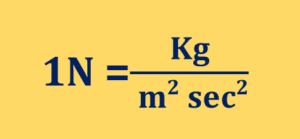The mass of a body is the quantity of matter possessed by it, whereas, the weight of a body is equal to the force with which the earth attracts it. Unlike weight, mass is a scalar quantity, and its value can never be zero.
This article includes an explanation of mass vs. weight along with simple examples.
Table of Contents
Mass vs. Weight
Mass is a measure of the amount of matter in an object, while weight is a measure of the effect of gravity on that mass. In simple terms, gravity causes a mass to have weight. The relationship between mass vs. weight is given in the equation below:

As a simple example to explain the difference between mass and weight, suppose your weight is 80 kg. On Earth, a scale would read 80 kg. As there is less gravity pulling on your body on Mars, you would only weigh 30.26 kg. Your mass, on the other hand, remains constant at 80 kg because it is the amount of matter that forms you.
There are several differences between mass and weight. Many of them are discussed in the table.
| Mass | Weight |
| Quantity of matter possessed by a body | The force with which the earth attracts a body. |
| Property of matter | Weight increases or decreases with higher or lower gravity |
| Scalar quantity | Vector quantity |
| SI unit is kilogram (kg) | SI unit is Newton (N) |
| Mass = volume × density | Weight = mass × acceleration due to gravity |
| Measured by beam balance | Measured by a spring balance |
| It can never be zero | It may become zero |
| Fundamental quantity | Derived quantity |
| Remains the same/constant everywhere | Changes with the change of gravity |
Key Points-Mass vs Weight
- Unlike weight, mass doesn’t change according to location.
- Mass can never be zero, whereas weight can be zero at zero gravity.
- The weight of an object can be calculated by multiplying the mass by the gravitational field (g = 9.8 m/s2 on Earth).
- The gravity of the Earth can vary by as much as 0.5% depending on our location on the Earth.
- The weight of an object on the Moon is 1/6th of the weight on Earth.
- Mass is a scalar quantity, and weight is a vector quantity.
Difference between Mass and Weight
Mass and weight are related concepts but they are not the same thing.
Mass is a measure of the amount of matter in an object and is typically expressed in kilograms (kg) or grams (g). Mass is a scalar quantity and is a fundamental property of matter, meaning it does not depend on the location or conditions in the universe. The mass of an object remains constant, regardless of its location or the forces acting upon it.
Weight, on the other hand, is a measure of the force that gravity exerts on an object and is expressed in newtons (N) or pounds (lb). Weight is a vector quantity and is dependent on both the mass of the object and the acceleration due to gravity. The weight of an object can change depending on its location and the strength of the gravitational field it is in. For example, an object weighs less on the moon than on Earth because the moon has a weaker gravitational field.
How to Find an Object’s Mass and Weight
We can find an object’s mass with the following equations:
- mass (m) = volume (v) x density (ρ)
Weight (measured in newtons) can be calculated by multiplying the mass by the value of the gravitational field (g = 9.8 m/s2 on Earth).
What is Force?
Force (F) is an external agent capable of changing the state of rest or state of motion of a particular body.
It can move or tend to move an object, or it can stop or tend to stop an object. It is a vector quantity.
F = m x a
Units of Force
- Newton
- Dyne (1 Newton = 100000 dynes)
- pound-force (1 Newton = 0.224 pound-force)

What is 1 Newton?
Newton is defined as the force necessary to provide a mass of one kilogram with an acceleration of one meter per second per second. One newton is equal to a force of 100,000 dynes in the centimeter-gram-second (CGS) system, or a force of about 0.2248 pounds in the foot-pound-second (English, or customary) system.
1 N =1kg x 1 m/sec2
How Weight is equal to Force?
Force (F) = mass (m) x acceleration (a) (Newton’s second law of motion)
if acceleration = gravity (g)
F = m x g
Therefore, weight = force.
Practice Problems
- What is the weight of a 60 kg mass object?
Weight = mass x acceleration.
W = 60 kg x 9.8 m/sec2
W = 588 N - How much does an 80-kg astronaut weigh in space, far from any celestial body?
The astronaut is truly weightless in space because there is no large body (planet or star) nearby to exert a gravitational force. His mass is 80 kg regardless of his location. - What is the weight of a 50 kg mass object?
weight = 50 kg * 9.8 m/sec2
weight = 490 N - A person’s mass happens to be 80 kg, while the gravity on Earth is 9.8 m/s2 and the gravity of the Moon is 1/6 of the gravity on Earth. Find out the weight of this person on Earth and the Moon.
W = m x g
WEarth = 80 kg x 9.8 m/sec2 = 7840 N
WMoon= 80 kg x 1.62 m/sec2 = 1306.4 N - Find the mass (m) and weight of a rock with a volume of 15 cm3 and a density of 3 g/cm3.?
m = density x volume = 3 g/cm3 x 15cm3 = 45 g = 0.045 kg
Weight = 0.045 kg/(9.8 m/sec2)
Weight = 0.0046 N
Summary
- Mass vs weight: A body’s mass is the amount of matter it possesses, whereas its weight is equal to the force with which the earth attracts it.
- Unlike weight, mass does not change with location. At zero gravity, mass can never be zero, but weight can.
- Mass is a scalar quantity and weight is a vector quantity.
Related Topics- Mass vs Weight
Gravitational Potential Energy (w=mgh)| Easy Examples
Can Force be Negative?| Easy Explanation
Atmospheric Pressure| Definition & Examples
How Much is a Liter of Water?| Glasses, Bottles, Cups, and
The Specific Gravity of Water
Bottom Line
This article explains mass vs. weight. We hope that after reading this article you are able to differentiate between both quantities, along with sound knowledge of the concept of force and the role of gravity in our lives. If you have any questions, please post a comment.
More Interesting Topics
- BCl3 Lewis Structure in four simple steps - November 1, 2023
- PH3 Lewis Structure in four simple steps - October 8, 2023
- PF3 Lewis structure in four simple steps - September 24, 2023



